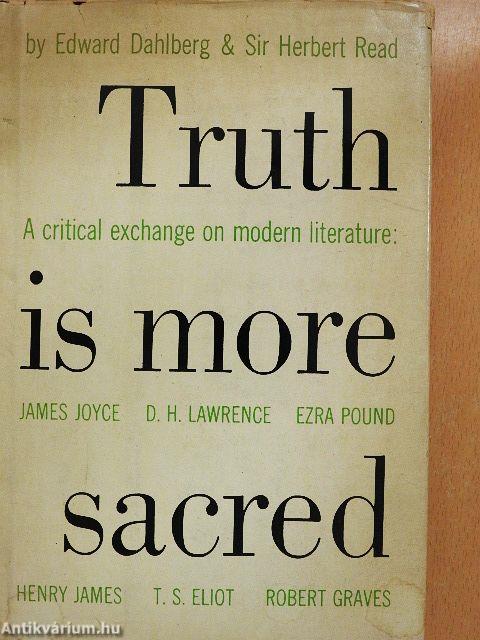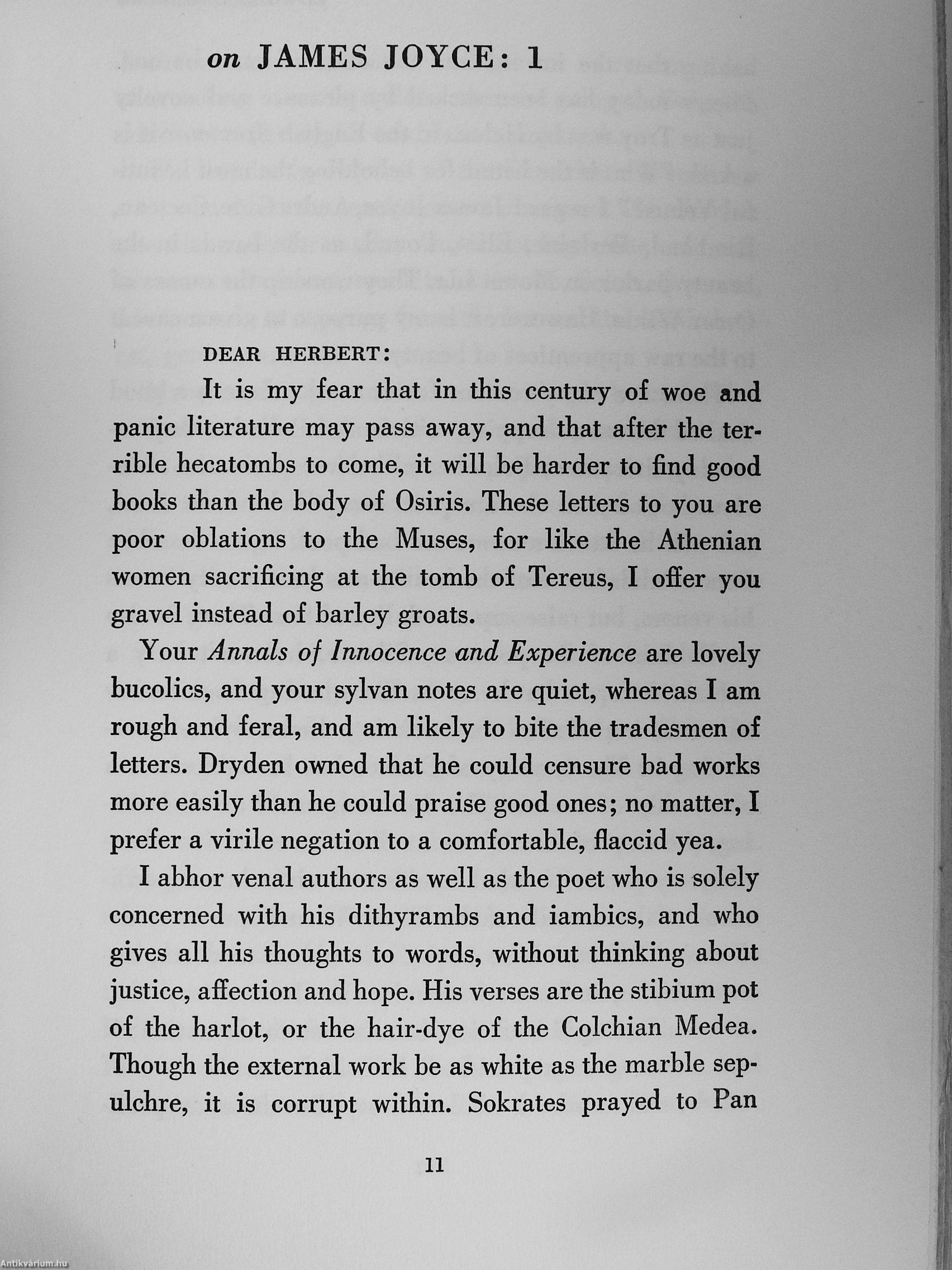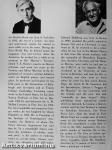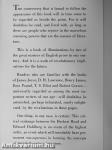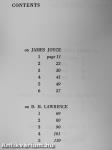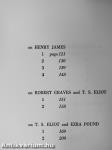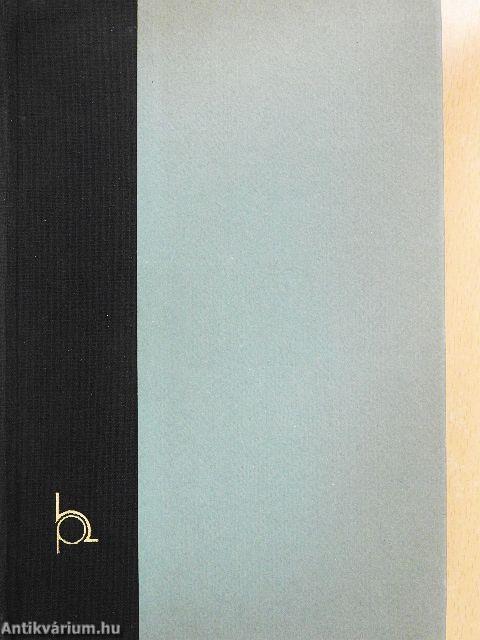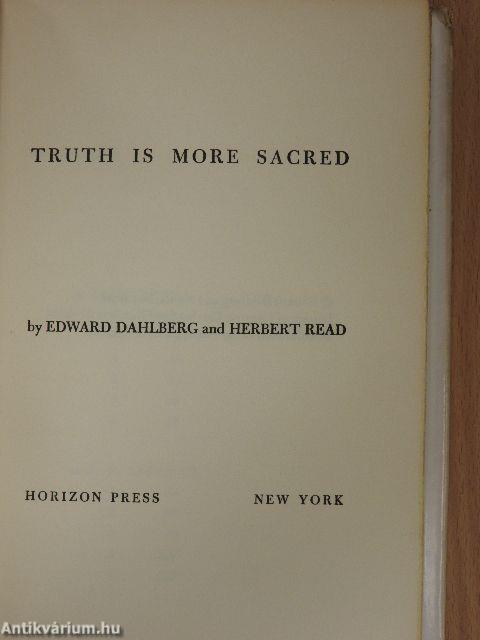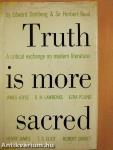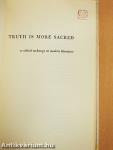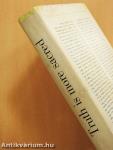1.103.855
kiadvánnyal nyújtjuk Magyarország legnagyobb antikvár könyv-kínálatát

VISSZA
A TETEJÉRE
JAVASLATOKÉszre-
vételek
Truth is More Sacred
A Critical Exchange on Modern Literature: James Joyce, D. H. Lawrence, Ezra Pound, Henry James, T. S. Eliot, Robert Graves
| Kiadó: | Horizon Press |
|---|---|
| Kiadás helye: | New York |
| Kiadás éve: | |
| Kötés típusa: | Félvászon |
| Oldalszám: | 222 oldal |
| Sorozatcím: | |
| Kötetszám: | |
| Nyelv: | Angol |
| Méret: | 22 cm x 15 cm |
| ISBN: | |
| Megjegyzés: | További kapcsolódó személyek a könyvben. |
naponta értesítjük a beérkező friss
kiadványokról
naponta értesítjük a beérkező friss
kiadványokról
Előszó
TovábbFülszöveg
Sir Heri)ert Kead was ijorn in Yorlcshire in 1893, the son of a farmer. An early and omnivorous reader, he started to write while yet in his teens. During the First World War he helped found the magazine, Arts and Letters. After the Armistice, he worked for a while as an assistant to His Majesty's Treasury, edited T. E. Hulme's papers on literary criticism, and spent ten years at the Victoria and Albert Museum in the department of ceramics, writing definitive works on English pottery and stained glass. As professor and lecturer he has held posts at the Universities of Edinburgh and Liverpool, and at Trinity College, Cambridge. Lecturing extensively in the United States, he has been Norton Professor of Fine Art at Harvard, 1953-54, and delivered the A. W. Mellon Lectures in Fine Arts for 1954. For his remarkable and numerous literary works, he was knighted by Queen Elizabeth in 1953. He is President of the Institute of Contemporary Arts, London. Sir Herbert, of whom The Times... Tovább
Fülszöveg
Sir Heri)ert Kead was ijorn in Yorlcshire in 1893, the son of a farmer. An early and omnivorous reader, he started to write while yet in his teens. During the First World War he helped found the magazine, Arts and Letters. After the Armistice, he worked for a while as an assistant to His Majesty's Treasury, edited T. E. Hulme's papers on literary criticism, and spent ten years at the Victoria and Albert Museum in the department of ceramics, writing definitive works on English pottery and stained glass. As professor and lecturer he has held posts at the Universities of Edinburgh and Liverpool, and at Trinity College, Cambridge. Lecturing extensively in the United States, he has been Norton Professor of Fine Art at Harvard, 1953-54, and delivered the A. W. Mellon Lectures in Fine Arts for 1954. For his remarkable and numerous literary works, he was knighted by Queen Elizabeth in 1953. He is President of the Institute of Contemporary Arts, London. Sir Herbert, of whom The Times Literary Supplement has said that he "in a remarkable degree combines the attributes of scholar, critic and poet," is the author of enduring works in several fields: literary criticism. art. education and philosophy, poetry, politics and autobiography.
Edward Dahlberg was born in Boston in 1900; attended the public schools in Kansas City and in Cleveland. A vagabond at 18, he resolved to be a writer when he was lost in the Mojave Desert at that time. His wisest teachers, with the exception of Heraclitus, Empedo-cles, Socrates, Cervantes and Sir Thomas Browne, were waifs he had met at the Y.M.C.A. in Los Angeles. He matriculated at the University of California in Berkeley, and took his B.S. at Columbia, and then went to Paris where he wrote his first novel. Bottom Dogs, for which D. H. Lawrence did the Introduction. Always a "beggar of the Mancha," he was concerned with the broken and the poor who had "windmills in their brains." After publishing three naturalistic novels which he detested, he became a literary eremite until he had finished a volume on American Literature, Can These Bones Live. After the death of Ford Madox Ford not a single man of letters came to his defense except Herbert Read. He contributed a great deal of verse to the little magazines, the prophetic oracles of America. He is also the author of The Flea of Sodom and The Sorrows of Priapiis, brought out by .lames Laughlin. whom Mr. Dahlberg describes as "a patron of letters rather than a merchant of books."
The controversy that is bound to follow the appearance of this book will in time come to be regarded as beside the point. For it will doubtless be read, and lived with, as long as there ai e people who rejoice in the marvelous renewing powers that are the essence of literature.
This is a book of illuminations by two of the great masters of English prose in our century. And it is a work of revolutionary implications for the future.
Readers who are familiar with the books of James Joyce, D. H. Lawrence, Henry James, Ezra Pound, T. S. Eliot and Robert Graves— universally regarded as among the most important writers of our age—will doubtless be astonished, perhaps infuriated, surely enlightened, by the revaluations in these pages.
One thing, in any case, is certain: This critical exchange between Sir Herbert Read and Edward Dahlberg is an event of the highest order, an event which will inevitably have permanent consequences in forming the concepts of twentieth-century literature. Vissza
Témakörök
- Irodalomtörténet > Írókról, költőkről
- Idegennyelv > Idegennyelvű könyvek > Angol > Irodalomtörténet
- Irodalomtörténet > Világirodalom > Európai irodalom > Angol
- Irodalomtörténet > Világirodalom > Amerikai irodalom > Észak-amerikai
- Irodalomtörténet > Irodalomtudomány > Tanulmány, tanulmánykötet
- Irodalomtörténet > Irodalomtudomány > Korszakok > 20. századi
- Irodalomtörténet > Irodalomelmélet > Irodalomkritika



